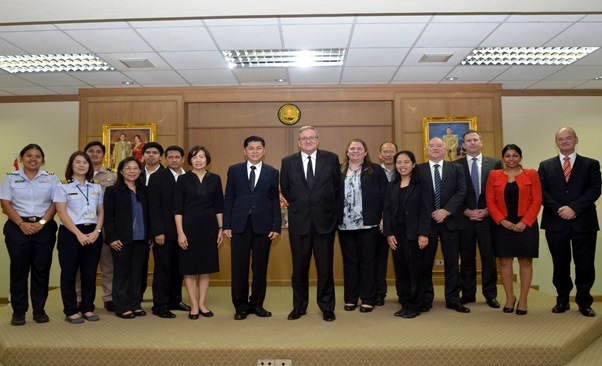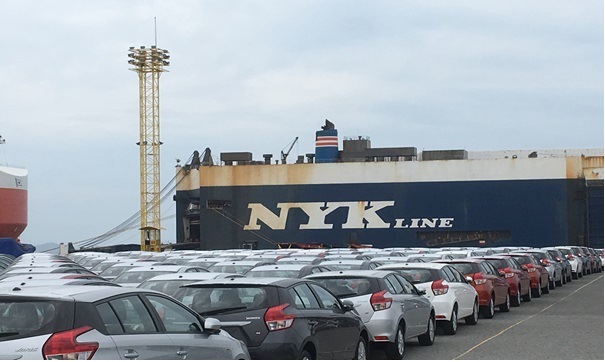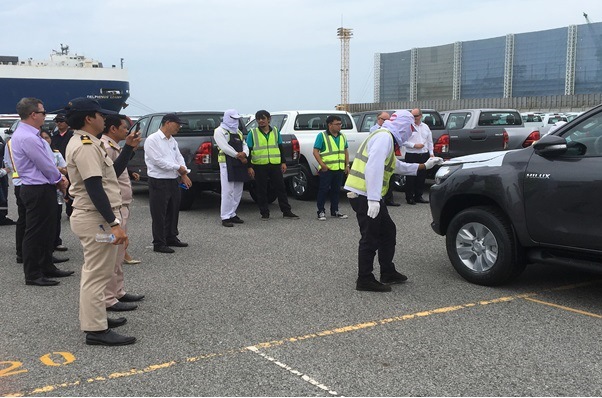Australia-Thailand partnership under the Motor Vehicle
Inspection Program helps Thai Cars Exports to Australia
4 April 2017
As part of its continuing partnership to facilitate trade and manage biosecurity risks from Thai vehicle exports to Australia, Australia’s Department of Agriculture Water Resources (DAWR) recently joined with Thailand’s Department of Agriculture, to brief the automotive industry on new arrangements for the Motor Vehicle Inspection Program (MVIP).
The industry briefing was presided over by Australian Ambassador to Thailand Paul Robilliard and Director General of Thailand’s Department of Agriculture Dr Suwit Chaikiattiyos. The session was attended by representatives from Thai automotive industry and manufacturers, representatives from Australia’s Federal Chamber of Automotive Industry and officials from Australia’s Department of Agriculture and Water Resources.
Thailand is an automotive manufacturing hub and in 2016 exported vehicles worth more than 600 billion baht. Australia is Thailand’s number one market for motor vehicles. In 2016, Thailand sold vehicles worth 170 billion baht to Australia. Increasingly popular was the Thai pick-up vehicles.
While Australia wants Thai cars, weed seeds or insects from Thailand that lodge in the vehicles are considered a biosecurity risk and are not wanted. New vehicles are pristine when they leave the manufacturing plant, but may pick up weed seeds and insects while waiting to be loaded on to the ships for transport. These unwanted ‘passengers’ can potentially harm Australia’s environment and economy if they became established in Australia.
Since 2009 Australia’s DAWR has implemented the Motor Vehicle Inspection Program to manage the biosecurity risk and maintain the trade between our two countries. Under this program DAWR officers work closely with officers from the Thai Department of Agriculture. New vehicles destined for Australia are inspected by accredited Thai inspectors before being loaded on to ships. The inspected consignments generally can enter Australia with faster clearance at the ports.
Australia’s Federal Chamber of Automotive Industry has supported the implementation of the program, with active engagement from the Thai automotive industry.
Since the program was launched the number of vehicles detected at Australian ports with widespread contamination as reduced by 82 per cent.
In 2016, the partnership was reinvigorated with the signing of a new arrangement that has taken the MVIP into a new phase. Under the revised arrangement, Thai automotive manufacturers and third party inspectors can perform the inspection and certification activities while the Thai Department of Agriculture oversees the process.
“I would like to congratulate everyone involved in this program, as it provides a very good example of trading partners working together, at all levels, the country-to-country, government-to-government, business-to-business and more importantly people-to-people,” Australian Ambassador to Thailand, Paul Robilliard, said at industry briefing session.
As part of the visit, the Australian delegates visited Nissan Motor (Thailand) Co Ltd, to see their operation, and Laem Chabang Port to observe a demonstration of the inspection of vehicles.

H.E. Paul Robilliard, Australian Ambassador to Thailand, and Dr Suwit Chaikiattiyos, Director General of Thailand’s Department of Agriculture, with officials from Thailand’s Department of Agriculture, Australia’s Department of Agriculture and Water Resources and representatives from Australia’s Federal Chamber of Automotive Industry.

Cars in the pre-loading yard

Demonstration of the car inspection process by an accredited inspector
